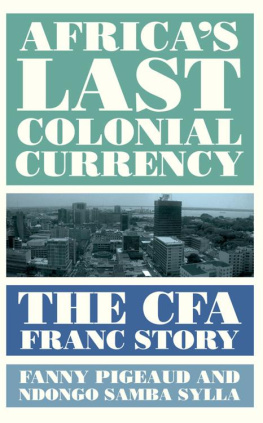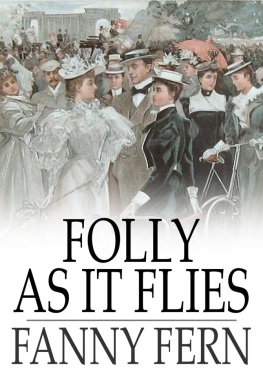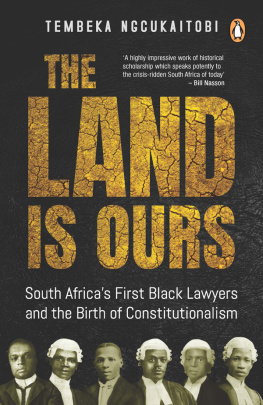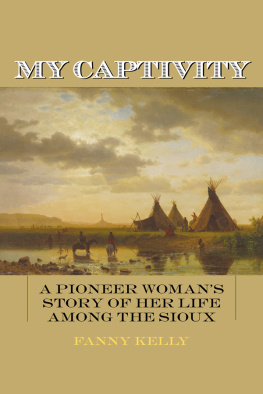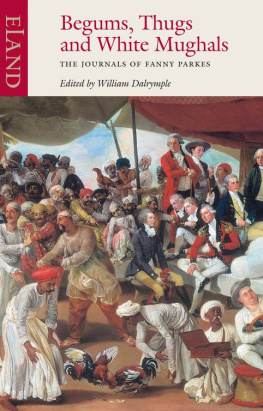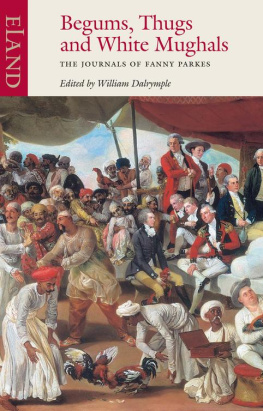Fanny Pigeaud - Africas Last Colonial Currency: The CFA Franc Story
Here you can read online Fanny Pigeaud - Africas Last Colonial Currency: The CFA Franc Story full text of the book (entire story) in english for free. Download pdf and epub, get meaning, cover and reviews about this ebook. year: 2021, publisher: Pluto Press, genre: Romance novel. Description of the work, (preface) as well as reviews are available. Best literature library LitArk.com created for fans of good reading and offers a wide selection of genres:
Romance novel
Science fiction
Adventure
Detective
Science
History
Home and family
Prose
Art
Politics
Computer
Non-fiction
Religion
Business
Children
Humor
Choose a favorite category and find really read worthwhile books. Enjoy immersion in the world of imagination, feel the emotions of the characters or learn something new for yourself, make an fascinating discovery.
- Book:Africas Last Colonial Currency: The CFA Franc Story
- Author:
- Publisher:Pluto Press
- Genre:
- Year:2021
- Rating:4 / 5
- Favourites:Add to favourites
- Your mark:
- 80
- 1
- 2
- 3
- 4
- 5
Africas Last Colonial Currency: The CFA Franc Story: summary, description and annotation
We offer to read an annotation, description, summary or preface (depends on what the author of the book "Africas Last Colonial Currency: The CFA Franc Story" wrote himself). If you haven't found the necessary information about the book — write in the comments, we will try to find it.
Africas Last Colonial Currency: The CFA Franc Story — read online for free the complete book (whole text) full work
Below is the text of the book, divided by pages. System saving the place of the last page read, allows you to conveniently read the book "Africas Last Colonial Currency: The CFA Franc Story" online for free, without having to search again every time where you left off. Put a bookmark, and you can go to the page where you finished reading at any time.
Font size:
Interval:
Bookmark:
Africas Last Colonial Currency
Colonial Currency
The CFA Franc Story
Fanny Pigeaud and Ndongo Samba Sylla
Translated by Thomas Fazi

First published by ditions La Dcouverte as Larme invisible de la Franafrique, Une histoire du franc CFA
English translation first published 2021 by Pluto Press
345 Archway Road, London N6 5AA
www.plutobooks.com
Copyright ditions La Dcouverte, Paris, 2018; English translation 2020
The right of Fanny Pigeaud and Ndongo Samba Sylla to be identified as the authors of this work has been asserted by them in accordance with the Copyright, Designs and Patents Act 1988.
British Library Cataloguing in Publication Data
A catalogue record for this book is available from the British Library
ISBN 978 0 7453 4178 1 Hardback
ISBN 978 0 7453 4179 8 Paperback
ISBN 978 1 7868 0668 0 PDF eBook
ISBN 978 1 7868 0670 3 Kindle eBook
ISBN 978 1 7868 0669 7 EPUB eBook
This book is printed on paper suitable for recycling and made from fully managed and sustained forest sources. Logging, pulping and manufacturing processes are expected to conform to the environmental standards of the country of origin.
Typeset by Stanford DTP Services, Northampton, England
Simultaneously printed in the United Kingdom and United States of America
Metropolitan France was torn in 2019 by the uprising of the gilets jaunes, who give credence to the prediction made by Christian Guilluy in his 2016 book Le crpuscule de la France den haut that there would be a modern slave rebellion against low pay, high unemployment, and high taxation, all of which has spawned rising inequality and a depressed material outlook among the working class in La France priphrique.
Guilluys culprits are the bourgeois-bohmes or bobos, the urban elites who have supported the economic policies of the upper class for 30 years now, which reward them with well-paid employment, superior status, rising wealth through housing price inflation, often through the gentrification of traditional working-class suburbs, access to a diversity of cultural pursuits and more. While they have embraced globalism, the working class, who live and struggle outside the new citadels, have increasingly been left behind.
To accentuate the divide, these global beneficiaries adopt a rather schizoid attitude to the disadvantaged. The bobos speak of international solidarity, and advance the Kantian dream of cosmopolitan republicanism. But then, as if forgetting their bountiful faith in humanity, they accuse those who support Brexit or the breakup of the EU, for example, as being particularists, racists, xenophobes, nationalists, who have abandoned their moral responsibilities to a greater humanity. This disdain soon morphs into accusations about fascism and the like.
Guilluys thesis helps us understand how the disdain for Brexit among the urban, educated elites, who otherwise advocate progressive policies, compromised the British Labour Party so much, that it reneged on its promise to support the June 2016 Referendum and suffered catastrophic damage to its electoral standing.
La France priphrique is in rebellion, albeit somewhat disorganised. But the shift in outlook is undeniable. And it has been exacerbated and engendered by the fact that the traditional political voices of the working class, the Socialist Party, has been complicit in introducing policies that have worsened the divide.
These trends illustrate how neoliberalism has evolved. Our meaning of the term periphery, which entered the lexicon via world systems theory, has evolved. The underlying neoliberal ideology that has created these urban regional divides in our advanced nations in recent decades is, in fact, an advanced expression of the earlier extractive mechanisms that the wealthy have used for centuries to further their ambitions through invasion and occupation (colonialism). In that context, the periphery referred to the less developed nations who were functionally related to the core nations, where wealth and economic power was concentrated.
A question I asked when I started working as a development economist was: why are African nations so poor, when they possess massive resource wealth and burgeoning populations, that would achieve high levels of education and skill development in advanced nations?
The traditional theory of economic development (modernisation theory) suggested that nations begin as undeveloped, primitive societies, and through industrialisation and development of governance institutions, transcend to developed status. A middle class forms as incomes grow and an export-orientation is then encouraged.
Accordingly, impoverished Africa requires interventions from advanced nations to make it rich. But the rival dependency theory, considers Africa to be rich with its assets being continually drained to the benefit of core wealthy nations.
Dependency theory was developed to articulate this extractive process. We learn that the core is reliant on exploiting resource flows from the periphery. The rich nations do not invest in income-poor nations to make them richer. This extractive process is necessary for the continued material prosperity of the core nations and the prevention of realisation crises. The exploitation evolved over time from brutal slavery regimes to more sophisticated and less obvious means of maintaining political and economic servitude.
In his 1967 book Capitalism and Underdevelopment in Latin America, Andre Gunder Frank, a fierce critic of the free market approach espoused by his mentor Milton Friedman, argued that the nations that we now consider to be developed were never undeveloped in the way we view African nations. Rather, the nations that are called undeveloped have a unique role in the world system unlike anything that the rich countries have ever played. He argued that the underdeveloped nations serve as an instrument to suck capital or economic surplus out of ... [the] ... satellites and to channel ... this surplus to the world metropolis.
What the mainstream considers to be a rather benign supportive role being played by the colonialist, is better seen as rich nations establishing processes (supported by institutions such as the IMF and the World Bank) to ensure that resources flow to the benefit of the advanced world. These processes, which include legal frameworks, tax rules, privatisation, and the imposition of fiscal austerity, undermine the opportunities of the income poor nations to benefit from their own resource riches. The middle class that forms work with the localised upper class to drain the resources in favour of the richer nations even more efficiently.
The Scramble for Africa carved up Africa among the advanced powers after they had successfully invaded the continent. A.G. Hopkins talks of the plunderers who depicted the Africans as being primitive and barbaric, which was a convenient smokescreen to legitimatise the invasions.
The sense of plundering chaos reached such levels in the early 1880s that war between the colonial claimants was seemingly inevitable. Britain and France, for example, were at odds over their claims in West Africa. The likely conflicts prompted Count Bismarck to organise the Berlin Conference in 1884 to provide a European-centric framework to regulate the Scramble and the resulting trade. Most European nations were represented, but the people of Africa were completely ignored. It was as if they were inanimate objects in the colonial quest for wealth and
Next pageFont size:
Interval:
Bookmark:
Similar books «Africas Last Colonial Currency: The CFA Franc Story»
Look at similar books to Africas Last Colonial Currency: The CFA Franc Story. We have selected literature similar in name and meaning in the hope of providing readers with more options to find new, interesting, not yet read works.
Discussion, reviews of the book Africas Last Colonial Currency: The CFA Franc Story and just readers' own opinions. Leave your comments, write what you think about the work, its meaning or the main characters. Specify what exactly you liked and what you didn't like, and why you think so.

